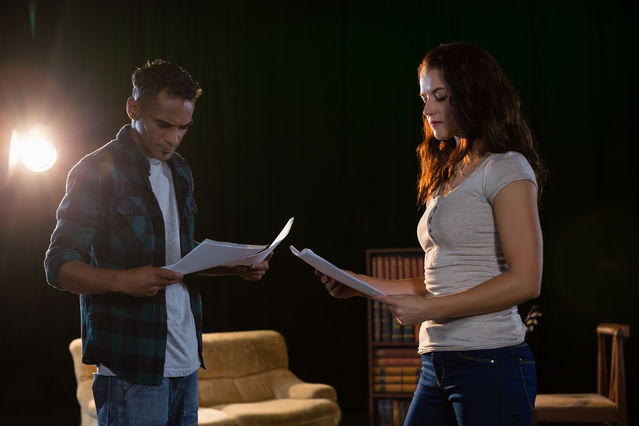Relationships
What if You Could Redo a Scene in Your Life?
Perhaps you can. Here's how to rewind moments to be a better you.
Posted September 19, 2018

My 9-year-old said to me a few days ago, “I sometimes don’t like the way I respond when I’m upset. Let’s practice different responses.” If we find each other or our children responding in unloving or disconnected ways or acting in inappropriate or disproportionate ways, we stop the scene and try it again. We treat life like it has do overs.
I know it sounds weird. But you can do this. It literally changes you and your relationships and your skills for future relationships. You're not stuck. You can change. You just don't practice. Change requires awareness and then the practice of a new skill. Seeing a therapist once a week is great, but if you don't practice these skills that you're exploring and discovering in therapy, you won't see much change in your life. New skills require practice and mental rehearsal. And if you don't help the system, the family, that you're apart of to become better then you won't be better. Sick systems contain sick people. Think about it this way: If you're trying to be healthier in your relationships but your relationships are held by people that communicate in unhealthy ways then either they will have to change or you will have to stay sick or leave the relationship.
You might even claim that therapy doesn't work. If it's not working, it's because you're not working to make change happen.
Insight is never enough. It doesn't work in athletics. You can't have a coach just spot a problem and not work with you to change it. It doesn't work in speech therapy. It doesn't work in any aspect of your life that requires change. Therapy is great. But one hour a week won't change you. Change requires work. And homework is an important part of Individual and Couples Therapy.
How this plays out is just like the rehearsals we do for a play or for a movie. If the scene isn't working, you just stop it. You redo it. And this is another big key: Any one of us, in that scene, or observing that scene, can stop it. In my family, we’ve given each other permission to be the directors of our lives. There is no one director. And the idea that all of us take responsibility for self and others creates within us the fortitude and capability of directing our lives with an interconnected sense of awareness. Children need to develop responsibility and problem solving skills. As a parent, it makes me less reactive to the behaviors of my children. We observe them and we know we can modify behavior in the moment, if we catch it early enough, and by not responding to and feeding into a tantrum we shorten it's duration. Don't feed tantrums. Observe. Walk away. They'll get worse before they get better. But don't feed the tantrum. And when it no longer works as a tool for getting their needs met, they'll try other ways of interacting. Support and respond to healthy and interconnected communication. Don't get me wrong, tired or hungry kids can have disruptive behavior, but it's much less these days. My children are developing into people we enjoy. They're simply fun to be around because they are coached to be socialized.
I suspect many of you do this in your close relationships or even at work already just not explicitly. Have you ever said, "Let me try that again? Let me rewind and see if I can clarify what I'm saying." Then you're already getting there. But when we rewind a scene, we do more than just change the words we are using. We change the entire scene—our tone, posture, and facial expressions—everything.
In life, when we are reacting and disconnected, it’s based upon either underdeveloped or outdated prior tools of navigating relationships. Our reactions should be in alignment with the “interconnected aspects” of each other and our responses should be appropriate and proportionate to the situation. Please hold on to that idea that our reactions should be APPROPRIATE and PROPORTIONATE. It will guide your responses. All of us have been on the wrong end of someone reacting in ways that are disproportionate or inappropriate. It's uncomfortable and can even be scary and it absolutely ruins relationships if it continues to happen. It's abusive. Stop hurting each other! Practice being a better you.
So, yes, anger can be an appropriate response but it has to be proportionate. You can say, "I'm angry and I'm hoping we can figure out a way to solve this." Anger doesn't have to disconnect you. Sadness can also be appropriate response but it has to be proportionate. Don't get me wrong, anger can be an inappropriate response too. We all know that. Sadness can also be inappropriate or disproportionate as well. Trust your shared instincts when navigating these things. When you work on being interconnected and your reactions are in support of the growth and the development of each other you'll find the right responses—the loving responses. Ask your partner for feedback in the scene, "Did I say that well?"
And most of us can sense when our reactions are disproportionate and inappropriate to a scene, an interaction, or a moment. Sometimes we're tired. Sometimes we are hungry or stressed. And we need to name it and say that and not react in ways that are disconnected. Just say, "Let me rewind, I'm sorry. I'm feeling tired or hungry and it's not you." Develop this awareness and give yourself permission to rewind the scenes of your life. Give yourself the permission to stop a scene and say, "I just don't have it in me to do this, but I care about what you have to say. Give me a few minutes, an hour, maybe a day." Speak with honesty. Develop the character you want to be in the scenes of your life.
In my family, we don’t just yell “stop the scene,” we use a word that forces us to recall a connected and joyful memory from the past. Then we call out that word. So, find a shared, powerful, and joyful memory, and then name that memory with a single word that you agree can stop a scene. One of my friends just says to his partner, “Can we pause?” That works too. My wife and I will often coach each other when parenting, in the moment, immediately, and then we repair if we didn't get it right with our children.
Another key is that you have to catch it early on in the scene before the scene gets completely hijacked by outdated and disconnected ways of being. Don't let your frontal lobe get disengaged. Catch it early and practice.
When you rewind the scene, this might even mean walking back out of the room and then entering it again and trying it again and again. You can even do this on the phone. I'll say, "Let me hang up, I'll call you right back, and we'll try it again." Rewind and practice. Train your children and your partners by using this technique to be interconnected. Again, therapy is great. But you need to practice becoming a better you. And if you have kids, you know you've already done this technique to a certain degree. You may have said to them, "Can you say this in a better way? Could you have done something different?" You'll even call out directions from off the stage to your children, when you're in the other room, with comments like, "Lower your voice. Go apologize. Shake hands." We do it all the time with our kids. We give them directions and ways to improve their character. I just chose to start doing it in all of my close relationships. It still works as an adults. We are capable of learning.
Recently, my 6-year-old was feeling defeated because one of his friends kept taking his scooter from him. My wife initially said, "Tell him it's your scooter, and you're going to use it." I then reminded her, we have to rehearse that scene. It's like telling someone who has never played the piano, "Go play the piano." It won't work. Change needs practice. So, we went into the garage, had him hold his scooter, and we all took turns having him rehearse saying, "It's my scooter. I'm using it." We repeated it multiple times. With different people to help him generalize this skill set. Later on that day, he had the chance to go live. And it worked.
The other thing we do is add in a reward after one of us gets it right or the kids get it right. We reward each other with a fist bump—a little dopamine helps to lock it in.
And yes, when you practice a new skill, at first it feels weird, like you're acting, and faking it, and that's normal. And, eventually, that dissonance, that feeling that you're faking it, will resolve as you continue to practice these new skills into existence and that new skill will become automatic and non-conscious and you'll just be that new person. There was a time when you didn't know how to ride a bike or write with a pencil. Now you do. It's automatic. There will a time when you automatically speak in ways that are interconnected, appropriate, and proportionate when you develop that skill as well. Couples therapy requires rehearsal and practice. And becoming the you, you want to be, requires practicing being that person. Practice it. Act. Fake it. Become it. And your relationships will grow in ways that you never anticipated and your children will become stronger, psychologically more flexible, and more resilient if you give them permission to redo a scene. Be kind to each other. Be kind to your partners. And rewind the scenes that didn't work and try it again. Enjoy this process. You simply don't know how great you can be until your practice becoming that person. Practice.
Look at this way, are you the best person that you can be in your relationships? Are you the kindness and most connected person in all of your relationships? Are you courageous? Bold? Honest? Loving? Is this the character you'd want to play in a movie? Are you the person that your partner deserves? Are you the parent your children need? If not, then practice being that new you. Act it into existence. See it. Mentally rehearse too.
Today, we never really have to do this technique. We have developed rapid short cuts to adjust in the moment. Sometimes we just smile when the scene is heading off track and quickly adjust it. Sometimes life requires second, third, and fourth chances.
Now don’t you sometimes wish you could have a retake? Well you can.
Go practice!




